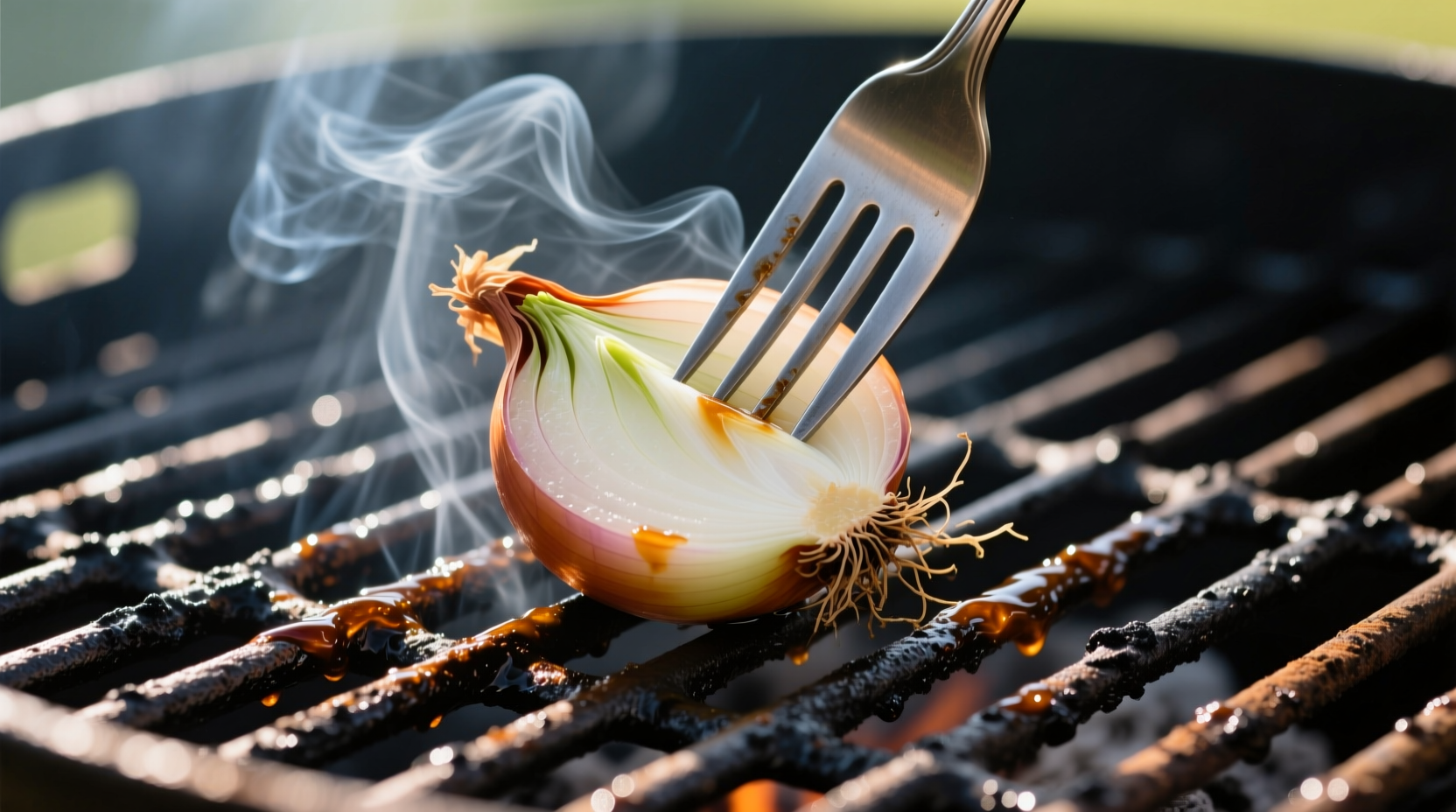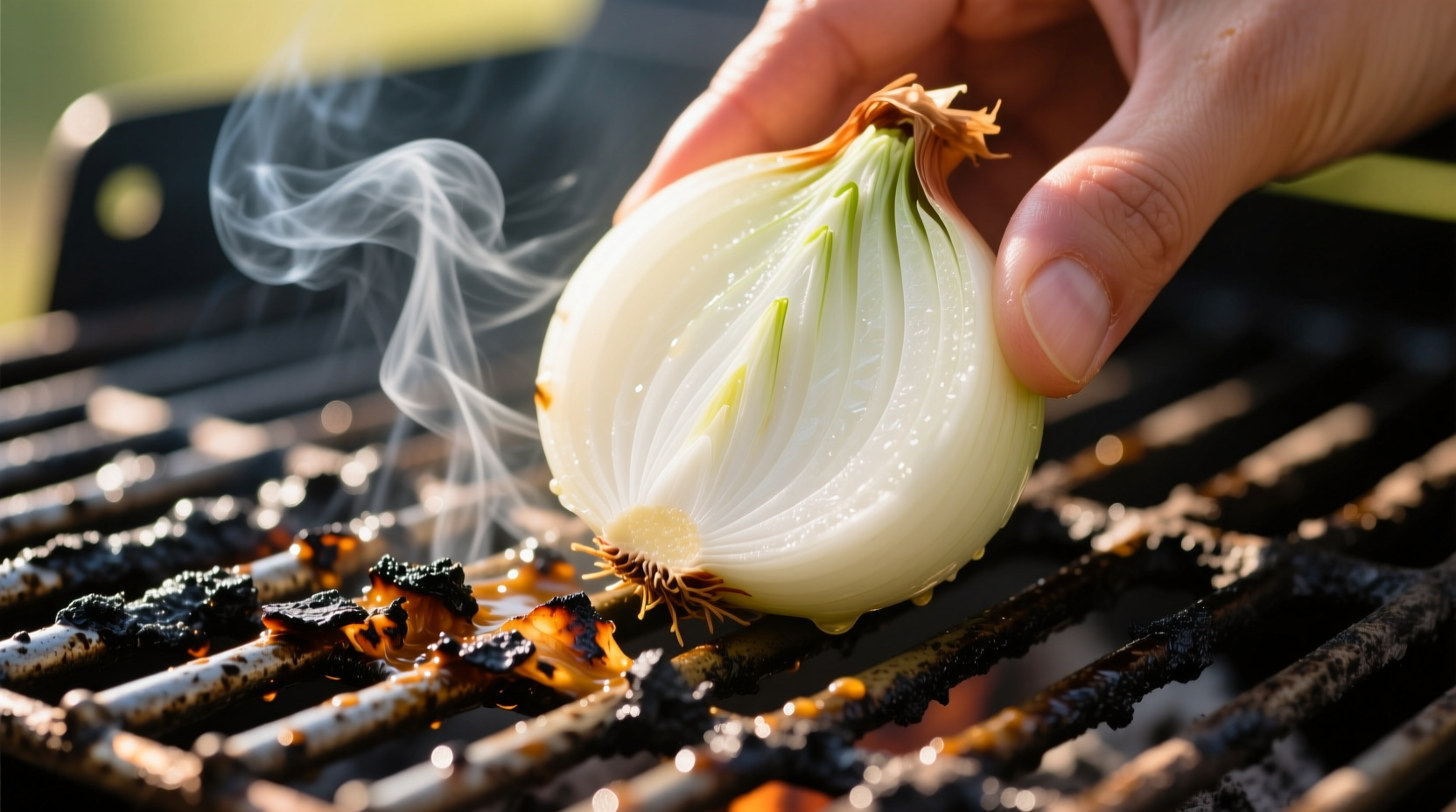The Science Behind Onion's Grill-Cleaning Power
Onions contain natural sulfur compounds and acidic properties that break down carbonized food particles and grease on grill surfaces. When heated, these compounds become more active, helping to dissolve stubborn residues without harsh chemicals. The fibrous texture of the onion acts as a gentle abrasive, while its moisture content creates steam that lifts debris from metal surfaces.
Step-by-Step Onion Grill Cleaning Method
Follow this proven technique for optimal results:
Preparation Phase
- Turn off your grill but leave it warm (300-350°F) - hot enough for the onion to sizzle but cool enough to handle safely
- Gather supplies: one large yellow onion, metal skewer or fork, heat-resistant gloves, and grill brush for final touch-ups
- Cut onion in half through the root end to maintain structural integrity during cleaning
Cleaning Execution
- Secure onion half firmly on skewer or fork, holding the root end for stability
- Rub the cut side firmly across grill grates using back-and-forth motion, applying moderate pressure
- Continue until onion releases sufficient juice and begins to blacken (typically 2-3 minutes per section)
- Replace onion half when it becomes too soft or loses effectiveness
Final Touch-Up
- Use standard grill brush to remove any remaining debris
- Wipe grates with damp cloth to remove onion residue
- Apply thin coat of vegetable oil to prevent rusting

Safety Considerations for Natural Grill Cleaning
While the onion method is generally safe, follow these precautions:
- Never use this technique on a blazing hot grill (above 400°F) to prevent burns from steam or splatter
- Always wear heat-resistant gloves when handling warm grill components
- Avoid using on porcelain-coated grates as the abrasive action may cause damage
- Ensure proper ventilation when cleaning to avoid inhaling any fumes from burning residues
Onion Cleaning Method vs. Traditional Techniques
| Cleaning Method | Effectiveness | Safety Level | Environmental Impact | Best For |
|---|---|---|---|---|
| Onion Technique | Moderate-High (for light-moderate buildup) | High (natural ingredients) | Eco-friendly (no chemicals) | Regular maintenance cleaning |
| Wire Brush | High (for heavy buildup) | Moderate (bristle risk) | Low impact | Deep cleaning sessions |
| Chemical Cleaners | Very High | Low (toxic fumes) | High pollution risk | Severe carbon buildup |
When Onion Cleaning Works Best (and When It Doesn't)
The onion method excels for regular maintenance cleaning after each use, preventing heavy buildup. According to the USDA Food Safety and Inspection Service guidelines for kitchen equipment maintenance, natural cleaning methods like this are recommended for routine upkeep of cooking surfaces (USDA FSIS Kitchen Sanitation Guidelines).
This technique has specific limitations:
- Not suitable for grills with severe carbon accumulation (more than 1/8 inch thick)
- Less effective on cold grills - requires residual heat to activate cleaning properties
- May leave temporary onion odor that dissipates after final heating
- Not recommended for cast iron grates that require specific seasoning protocols
Pro Tips for Maximizing Onion Cleaning Results
Professional grill masters from the Hearth, Patio & Barbecue Association recommend these enhancements to the basic technique:
- Add lemon juice to the cut onion surface for extra grease-cutting power
- Combine with aluminum foil ball for tougher spots while maintaining chemical-free cleaning
- Follow with a final pass of halved potato to create a protective starch coating
- Perform this cleaning ritual immediately after cooking when grates are optimally warm
Integrating Onion Cleaning Into Your Grill Maintenance Routine
For best results, incorporate the onion cleaning method into a comprehensive grill care schedule:
- After each use: Quick onion cleaning while grates are warm
- Monthly: Deep cleaning with approved grill cleaner for thorough maintenance
- Seasonal: Complete disassembly and inspection of all components
This approach prevents the need for harsh chemical treatments and extends your grill's lifespan significantly.











 浙公网安备
33010002000092号
浙公网安备
33010002000092号 浙B2-20120091-4
浙B2-20120091-4